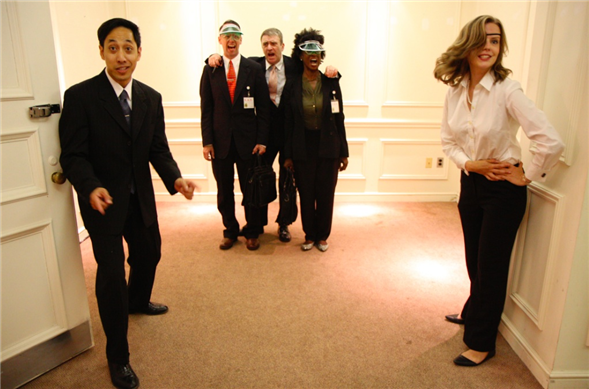For a practical lesson in economics, try being hungry on Governors Island. The ferry ride to this lovely enclave is only $2---or completely free if you sail out early---and considering all the activities, views, and traffic-free silence the place offers, that's a spectacular deal.
But if you don't bring your lunch, noontime might find you on the receiving end of an $8 sandwich. And if you want a lemonade, that'll be $12. Is it worth it? Does that transaction change your sense of the entire experience?
Such predicaments make Governors Island the perfect home for HERE's Trade Practices, which runs through Sept. 21 and is co-created by David Evan Morris and HERE artistic director Kristin Marting. Set in the historic Pershing Hall, the show meditates on behavioral economics by telling site-specific stories about the boom and bust of a fictional paper company.
The production itself is as massive as the topic it treats. Marting and Morris developed characters and concepts with the help of an epic flow chart of narrative threads. Along the way, they enlisted six playwrights to craft intersecting storylines and recruited a video designer to make company orientation videos and financial news reports. They also cast ten actors who not only come together for group song and dance numbers, but also disperse into Pershing Hall's various rooms to play out individual dramas about the paper company's owners, workers, management, and communications department.
The audience helps create the experience, too. It's impossible to see every element of the show, so patrons "invest" in the stories they want to follow. Using fake money that's handed out by the cast, they regularly gather in a room called the "trading floor" to buy entry into various scenes.
For example, if someone wants to see what happens to the worker who's being spied on by an owner's cousin, then she might have to pay eight fake dollars to keep following the story. However, the latest chapter of the management drama, where two characters get increasingly ruthless in their quest for promotions, might be selling for a mere four dollars. A choice must be made.
To keep the market active, it's essential for Morris and Marting to offer different perspectives on the narratives. So in the group numbers, which happen on the trading floor, characters might sing about the benefits of liquidating versus saving. "We've really tried to be open-ended because we want people to make their own value judgments," Marting says.
Perhaps not surprisingly, Trade Practices was in part inspired by the economic crisis and financial collapse of the late aughts. Marting recalls, "As artists we were not invested in the market, so we were left wondering, 'How could this have so much impact? How the f*** does this s*** work? Who gets to decide?"
As she and Morris read up on money matters, they realized how much they hadn't understood. "We began to question some of the ideas we had come away with from the financial crisis" Morris says. "[That] was another reason it was important to have multiple audience perspectives along with consequences to the decisions the audience makes."
To that end, Morris says the audience participation element is more than just a game: "You hopefully start to consider what you value and apply it to the outside world."
---
Eliza Bent is a Brooklyn-based journalist and playwright
Photos by Carl Skutsch
